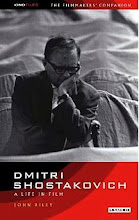
We're just about half way through the London Film Festival (a couple of posts to come) and already on the horizon is the Third Russian Film Festival which precisely abuts it, starting the day after the LFF (30 October) and running until 8 November.
As usual it concentrates on the newest Russian cinema (this year with ten UK premieres), but they've expanded the docs and shorts section and there's an archive strand showing the five great Alexandrov-Orlova musicals. All this with the usual set of guest speakers and debates.
The features (which I'll quickly cover here) are dominated by films from the big names. Sergei Soloviev has two titles: Anna Karenina (literary behemoths have made popular source material recently). Somewhat unexpectedly, Soloviev sees a companion piece to Anna Karenina in his other festival film, Assa-2, a sequel to his cult perestroika rock classic from 1988. Amongst its cast is the great violist Yuri Bashmet, who began as a bassist in a rock group.
More literature with an updating of Chekhov's Ward 6 (Палата 6) from Karen Shakhnazarov. In between running Mosfilm, Shakhnazarov has made some intriguingly structured films, often intertwining humour and dark, moral ambiguity, so it will be interesting to see this tale of mental disintegration.
Nikolai Dostal's Pete on the Way to Heaven (Петя по дороге в Царствие) might sound like a sequel to his wry 1991 comedy Cloud-Heaven (Облака рай) but, though it features another simpleton in nowheresville, it's more politically engaged. Another film about the events of 3 March 1953? That sounds almost like the beginnings of a season in itself.
The flight of Yuri Gagarin is another historical moment that's had a recent cinematic outing: though appearing only briefly, the cosmonaut was central to the plot of Alexei Uchitel's (to me, slightly disappointing) Dreaming of Space (Космос как предчувствие, 2005). In Paper Soldier (Бумажный солдат) Alexei German Jnr takes a darker view of the events.
More literature, this time Nabokov, with Andrei Eshpai's The Event (Событие). Nabokov isn't generally remembered for his plays and Eshpai avoids it being a simple filming. He comes from a line of composers (Yakov Andreyevich and Andrei Yakovleyevich), and he brings a similar degree of musical sensitivity to the film - central to it is the music of Bach, adapted by his father.
Melody for a Street Organ (Мелодия для шарманки) continues Kira Muratova's recent strong run of films. Muratova is wonderfully attuned to the soundscapes of her films (though sadly its an aspect of her work that's often overlooked) and here, as in some of her others, the score is by the great Ukrainian composer Valentin Silvestrov.
One genre that isn't really associated with Russia is the mockumentary, but while in the west it's often a chance for some gentle humour at the expense of a tangentially important subject, Russia 88 (Россия 88) strikes at one of the country's hearts: patriotism, nationalism and xenophobia. Like all successful mockumentaries there's an ambiguity about the central character and there's been a huge debate about whether it actually promotes the neo-Nazism that it portrays - an effect that is disturbingly intensified by the unprompted vox pops that support such views.
Despite some more positive prognoses for the country there's still a supply of bleak films and Nikolai Khomeriki's Tale in the Darkness (Сказка про темноту) fills that role here. A brutalised far-Eastern population and child cruelty beings to mind Freeze Die Rise Again (Замри умпи воскресни) but this is a contemporary - and harrowing - story, though some critics saw light at the end of the tunnel.
Undoubtedly the weirdest feature in the festival is First Squad (Первый отряд). There's an undeniable mystical streak in the national character. War films have always been popular there. They have a great animation tradition. The country has an interesting relationship with Japan. Hey presto - a supernatural WW2 anime! Clearly, 14 year-old Nadya (of course, Russian for 'hope') is no Slavic Tank Girl but First Squad can't be anything less than interesting (and must be more successful than the Tank Girl film!)
